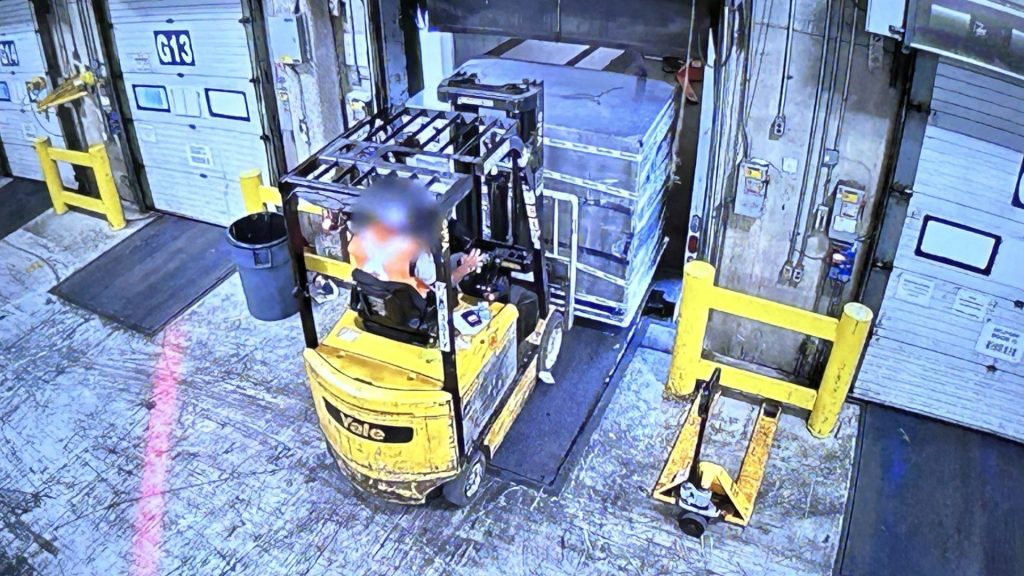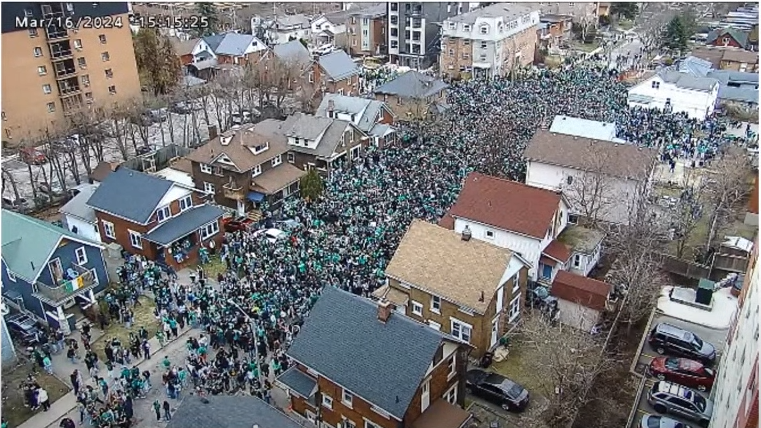Snow clearing policies problematic for those with disabilities
Posted Dec 23, 2021 06:59:00 PM.
Teresa McQuillin’s daughter nearly slipped under a bus because of an uncleared bus stop. That was four years ago. Since then, the Waterloo woman has been tirelessly advocating for local snow removal practices to become more accessible.
“Many disabled people don’t leave their homes all winter, knowing they cannot safely get around,” McQuillin said.
“I’m a parent to a child who has multiple disabilities, and she is a part-time wheelchair user. We don’t have a vehicle, so rely on active transportation and transit to get around — and my kiddo is high risk for COVID, so for the past two winters, our transit use has been extremely limited so our mobility has been pretty much limited to me walking/her riding, and as such navigating sidewalks.”
Despite repeated attempts, last winter they were unable to safely get off their street for over three weeks because all the curb cuts were blocked by plowed snow and ice, which she says was deemed “cleared” by bylaw officers.
“It's hard to describe the level of impact this has on one's life, unless you experience it — but that essentially means three weeks of being unable to leave our house or risk injury or pain,” she said.
This has often caused her daughter to lose access to getting around for things like appointments, socializing, schooling, groceries, etc.
The GRT’s current policy for snow clearing in the region is to start clearing 24 hours after a storm finishes, with the aim of clearing all bus stops within 72 hours after the snowfall stops.
“That’s potentially four days worth of inaccessible stops,” she said, adding that services like MobilityPlus are “nearly impossible” to book on the day of because of ride limits.
“So if we get a big snow dump and have somewhere to go that requires transit, we simply can't get there. Over the years we've missed long awaited specialist appointments, meetings, therapy, educational commitments, etc., because we simply couldn't get there in winter due to lack of consistent sidewalk/bus stop clearance.”
For the past four years, McQuillin said she has been pointing out the barriers, sharing pictures and describing the human rights violations her daughter faces to the municipalities.
“I have reported, followed up on the reporting, asked that the reporting system be changed, asked for proactive enforcement — and, ideally, for city-wide clearing … It always comes down to money,” she said.
Brenda Robinson is a co-chair on the Grand River Accessibility Advisory Committee, which advises municipalities on how to become more accessible. They believe sidewalk snow removal should be to bare pavement, and encourage municipalities to assume responsibilities for sidewalks.
However, Robinson said the municipalities haven’t been following their advice, because of budgetary issues.
“Yet, it's estimated to be at a cost of just $89/house per year, less than $7.50/month … and that cost would create savings in GRT's budget,” McQuillin said.
Kitchener has made some improvements with pilot projects and more “proactive enforcement,” as well as an assisted snow removal program directed at people with disabilities, which increased its capacity from 200 to 250 this year.
But, she says, “Waterloo seems to be stagnated in its approach, which just leaves people floundering.”
“The cities have actively chosen not to take on sidewalk snow clearing due to costs, despite knowing that the current system doesn't work, that it disproportionately affects those with disabilities, and Kitchener's pilot projects have shown clear benefits of snow clearing.”
In terms of reporting to bylaw, because of staffing restrictions, complaints tend to be investigated between one and three days after being reported, and can’t come through until 24 hours after snow stops, which again leaves potentially four days of uncleared sidewalks.
Uncleared sidewalks and curb cuts blocked by snow and ice from plows can be an issue for those with vision loss and blindness as well.
“Cane users depend on tactile guidance to know where they are and to feel sidewalks ending, but with uncleared snow this means they could easily end up in traffic unknowingly, lose their way, or slip and fall,” McQuillin said.
Waterloo city councillor Tenille Bonoguore says that McQuillin isn’t alone in these concerns, and she has raised the issues with senior staff, as well as the challenges of windrows (big snowy residue left behind by snow plows) at pedestrian crossings.
“Last year, Council approved a new pilot program for winter maintenance,” Bonoguore said. “One of the big changes residents might notice this year is more robust enforcement. The goal is to respond to complaints within 24 to 48 hours. Bylaw then gives people 24 hours to clear their sidewalk. If they don’t, a city contractor will come the next day, with the cost charged to the resident.”
Other changes already implemented include an additional bylaw officer responding to complaints, which she says will be active over the holidays and a new accessibility advocate working with municipal enforcement to “support a deeper understanding of these issues.”
“The city currently clears almost a quarter of sidewalks and trails in the city. Elderly residents and people with disabilities who cannot clear their own sidewalk can apply to Home Support Services for reduced-cost snow clearing. Unfortunately, this program fills up really quickly,” she said.
In terms of what the community can do, she encourages residents to clear their sidewalks sooner than 24 hours after a snowfall, and to help neighbours who can’t.
“Residents should know that a “clear sidewalk” means clear down to the pavement – or as close to that as possible – for the full width of the pavement, including at intersection corners. This is hugely important as it supports all modes, from strollers to walkers to wheelchairs,” Bonoguore said.
But better yet, McQuillin says to “write city leaders and advocate for city-wide clearing — it is the only way to ensure consistency, safety and access for those with disabilities.”










